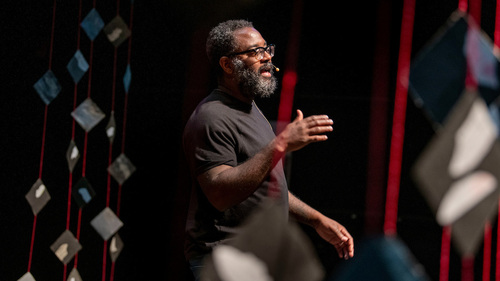
When Reginald Dwayne Betts hears the word prison, his first thoughts aren’t about violence or distance or time — he thinks about books.
Betts, an artist-in-residence in the Notre Dame Institute for Advanced Study and the Notre Dame Initiative on Race and Resilience, was sentenced to nine years in prison as a 16-year-old. It was there that a book, slid under the door of his cell, changed the course of his life.
Now an acclaimed poet, graduate of Yale Law School and 2021 MacArthur Fellow, Betts presented the debut of his solo show on Wednesday and Thursday evening (Nov. 17 and 18) in the Regis Philbin Studio Theatre at the University of Notre Dame’s DeBartolo Performing Arts Center.
“Felon: An American Washi Tale” brings together elements of theater and fine art — including handmade paper made from his friends’ prison uniforms and scraps of letters — with excerpts from Betts’ most recent book of poetry, “Felon.”
The performance explores the lasting effects of incarceration, along with themes of racial injustice, family legacy, identity — and the power of the written word.
It also allows him to explore the “space between” the poems in his collection, Betts said.
“You write a collection of poems, and it’s always the space between the poems that tells a story, and you hope it’s the space after the poems that tells a story,” he said. “The book is meant to be a solitary event that people read on their own and, as a public event, it doesn’t always capture what I want to capture. So, I thought about what it would mean if I did a solo show.”
The show opens with Betts’ description of how he received a copy of “The Black Poets,” an anthology edited by Dudley Randall, through the prison’s underground library system. After discovering the works of Etheridge Knight in the book, Betts began writing himself.
“When I first said I was going to be a writer, it was, you know, a wild ambition. I didn’t know what that meant,” Betts said. “Then I read his poetry, and I found out that he’d served time in prison. He's writing about a 16-year-old that went to prison, and I went to prison at 16.
“I was 17 at the time that I read it, and it made sense for me to become a writer. I had an ink pen, and I had paper. I started writing essays, whatever I could, whatever I needed to.”
Betts, who earned an MFA in poetry and is pursuing a doctorate in law at Yale University, has published three critically acclaimed collections of poetry and a memoir, “A Question of Freedom: A Memoir of Learning, Survival, and Coming of Age in Prison.”
In the show, Betts notes that he was released from prison on March 4 — “the only day on the calendar that is both a date and a command.” And “march forth” is a directive he has clearly heeded. A fierce advocate for those incarcerated, he is also the founder of Freedom Reads, a project that aims to place libraries inside prisons throughout the U.S.
Betts has personally curated a collection of 500 books to be included and worked with a design team to ensure that the libraries themselves are a space of beauty.
“When you’re in your cell, you just look out at concrete, a sanitized environment. There’s nothing natural there. There’s nothing beautiful,” Betts said. “Here at Notre Dame, everything around us is beautiful. And it’s intentionally so because there is an underlying belief that a part of the human experience and the human experience of education is beauty. … So, this project is not just about books, but it’s also about beauty and a level of dignity.”
The project is currently installing its first libraries in prison facilities in Massachusetts and Louisiana. In the spring, Betts also hopes to place one in Indiana’s Westville Correctional Facility, where Notre Dame and Holy Cross faculty lead a transformational liberal arts education program for inmates.
Throughout the show, Betts interweaves lines from his poem “Ghazal,” which focuses on the challenges of life after prison and ends with the line: “Shahid you’re loved, not shipwrecked after prison.” One of his goals for the show — and for his engagement with Notre Dame students and faculty this year — is to encourage others to seek ways to show love to those imprisoned.
“If we want to radically change the circumstances and conditions that lead to incarceration, we have to pay attention to the people who are inside,” he said. “I think the first tenet of love is attention, and we haven’t paid people in prison attention. It was the thing that I longed for most while I was incarcerated. And books helped give me the attention that I desired, but how much better might it have been if there was a system that encouraged me to pay other people attention and encouraged the world to pay us attention?”